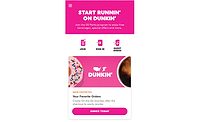BYB Brands Ready to Run Beyond Consolidated
By ELIZABETH FUHRMAN
A game exists for those who want to play. But the game has changed and so have the rules. Even baseball players know they can’t always bat 1,000 though, and so does Coca-Cola Bottling Co. Consolidated’s new start-up BYB Brands Inc., located near Consolidated’s complex in Charlotte, N.C. But the willingness to step up to the plate is what the company believes will make all the difference.
BYB Brands’ President Norm George remembers when
he initially took his idea to create a full-service brand company that
would focus on new and alternative non-carbonated beverages to Frank
Harrison, Consolidated’s chairman, and Bill Elmore,
Consolidated’s president. The reception, he says, was
“interesting.”
“Looking at the facts and at the long term of
what was happening with the U.S. soft drink industry, the games and the
rules are different now,” George says. “For those that are
going to be successful in the next five to 10 years, it’s not about
mass marketing anymore. It’s about niche products, not just line
extensions.”
Late in the summer of 2005, Consolidated completed a
comprehensive long-range plan in which a central pillar was business
expansion, Elmore says. “There was this notion that while we’re
absolutely wed to being the best Coke bottler that we can be, and the
franchise has, is, and will continue to be the core of what we do, we looked at the notion of what it is that we’re really
good at,” he says.
The bottler carefully considered its core capabilities
and how they could be leveraged beyond franchise sales. It concluded that
its subsidiaries such as Swift Water Logistics, which provides distribution
systems to make direct store delivery more efficient (see Beverage Industry October 2006
issue at bevindustry.com); Data Ventures LLC, which provides information
software; and BYB, which makes Consolidated a brand owner, are all highly
viable means of increasing revenue for the core company.
“We see the industry changing very
quickly,” Elmore says. “There’s a lot of opportunity.
There’s a need for nimble innovation and risk-taking — frankly,
a willingness to not bat 1,000. We believe we have the capabilities to do
that, and we have the passion and the energy to go after that. We see it as
a key growth platform for our company.”
This evolution also brings another facet to the
intricate relationship between the bottler and The Coca-Cola Co., which
holds a 27 percent equity position in Consoli-dated, but retains no voting
stock. Consolidated bottles about 7 percent of all Coca-Cola products sold in the United States.
“It’s a new chapter in that there is a
clear interdependence in our system between the bottler and [The Coca-Cola
Co.],” Elmore says. “At least in the United States this is a
new development. But like anything else, I think there is a need for us to
re-evaluate our current business model, and through this sort of change we
can all get to a better place. Nobody will dispute the need for both the
company and the bottlers in the United States to get to a better place.
I’m not suggesting that this will solve that problem, but we see this
as a component to that solving.”
The subsidiary found its first beverage when Larry
Trachtenbroit, president of Brain Twist Inc., New York City, brought
Cinnabon Premium Coffee Lattes for Consolidated to consider for
distribution in its territories. Consolidated contemplated the proposition,
and decided it was interested in more than just distributing the product.
BYB purchased the brand along with licensing rights from Brain Twist and
Cinnabon Inc., and an entrepreneurial-minded company was formed.
George’s development and planning of BYB began
by noticing a trend that most successful new product launches began with
small with grassroots marketing, and most of the products were perceived as
better-for-you. With more than 2,500 new beverages created in 2006, a few
winning propositions made it. But not all the products that failed were bad
ideas. Many people creating new beverages don’t have the working
capital or customer connections, George says.
“There are people in industries across the board
that have a great idea but don’t have the know-how to get it to
market,” George explains. “BYB is a brand owner with the
capabilities of how to get to market. We’re a combination of brand
owner and really being entrepreneurial. Part of our business model is just
developing brands. BYB is not a distributor.”
BYB stands willing to launch a beverage in any retail
channel through any distribution route available, whether that be DSD or
direct to the retailer, George says. But BYB does realize that being a
subsidiary of Consolidated plays a huge role in meeting its distribution
needs and launching a product. Any brand BYB launches immediately holds the
opportunity to launch in 10 states.
“What other entrepreneurs are in the business
that can go and launch in 10 states like that?” George asks.
“Usually they would have to start in 10 cities with 10 different
distributors.”
No boundaries
But BYB has moved beyond Consolidated’s regions
with the help of other distributors, such as Anheuser-Busch, Miller and Coors distributors, and at the beginning of 2007 with Cadbury
Schweppes Bottling Group and Snapple Distribution Co., which took on the
national launch of Cinnabon Premium Coffee Lattes.
Released in December 2005, Cinnabon Vanilla Latte,
Caramel Nut Latte, Espresso & Cream and Mocha Latte initially debuted
in the Southeast. The coffee drinks were co-developed by BYB and Brain
Twist Inc. through a licensing agreement with Focus Brands Inc., Atlanta,
the parent company of Cinnabon Inc. With the Cadbury Schweppes distribution
deal, Cinnabon Premium Coffee Lattes will be available in 41 states.
Cadbury Schweppes will distribute the lattes through its principal
subsidiaries, Cadbury Schweppes Bottling Group and Snapple Distribution
Co., which cover 33 states from New York to California.
From the beginning, BYB wanted to take Cinnabon
nationwide, George says, and Cadbury Schweppes felt comfortable enough with
BYB’s drive to establish a long-term contract. BYB’s
relationship with Cadbury Schweppes developed out of Cadbury
Schweppes’s previous partnership with Consolidated. Consolidated
ranks as the largest Sun Drop bottler for Cadbury Schweppes, with 27
percent of its volume.
While BYB’s other distribution agreements for
Cinnabon already placed the latte drinks at No. 2 in the RTD coffee
category, the Cadbury Schweppes agreement has strengthened its position.
“The most important thing is when retailers, buyers and consumers are
buying it, they all know Cinnabon,” George explains.
“That’s part of the hook of the licensing agreement.
We’re not walking in and trying to sell them something they
haven’t heard of. Cinnabon has 80 percent unaided
awareness.”
So far 2007 looks great for Cinnabon lattes, George
says. “High quantities is one thing,” he explains. “You
are going to drive some numbers initially, but our focus is on repeat
sales. We’re staying focused on aggressive sampling throughout the
United States.”
Additionally, BYB benefits from retailers’
desire to have several competitors in a category. “If there is just
one, they are smart enough to realize that they don’t have a lot of leverage,” George explains.
“We definitely respect the leader who built the
category, but there is room for a strong No.
2,” George continues. “A lot of companies have wanted to copy,
but no one has built up the scale quite big enough. We have a long way to
go, but we’re through the gate.”
Some might perceive BYB’s marketing of Cinnabon
Premium Coffee Lattes as a conflict of interest between Consolidated and
The Coca-Cola Co., with Coca-Cola’s recent launch of Godiva Belgian
Blends (which Consolidated currently does not distribute) and the
anticipated launch this summer of Caribou RTD iced coffee drinks. But
George says BYB is not about The Coca-Cola Co., but about
Consolidated’s ability to grow long term.
Off and running
The task of growing Cinnabon latte sales and building
other launches is accomplished by a team of seven at the corporate offices,
focusing on business and brand development,
marketing and customer service. Five regional
sales managers in Los Angeles, Chicago, Dallas, Philadelphia and Columbia,
S.C., manage a sales team of more than 15. BYB’s goal is to move fast
with new product launches, giving the team 12 weeks from initial concept
until the product is ready to hit the store shelves.
“Speed today is critical,” George says.
“Brands today may not last 100 years, but maybe a brand will launch
that will make a lot of money for just two years.”
Following Cinnabon latte’s launch in 2005, BYB
released Respect: Mind and Body in 2006. The vitamin-enhanced beverage
initially launched in four flavors — Mixed Berry, Cranberry Apple,
Pink Grapefruit and Peach Mango — and carries the tagline,
“You’re not artificial, why should your drink be?”
Just as BYB is a work in progress, so are its brands.
Beginning this July, Respect will re-release in a new format targeting
specific health benefits. Respect will now feature the four health benefit
categories of “Replenish,” “Rejuvenate,”
“Protect” and “Reflect.” They will carry the same
vitamin and mineral base of vitamins A, C, E, B2, B3, B5, B6 and B12,
calcium and potassium.
Each category then will carry two SKUs of two
different flavors that include additional ingredients targeting a specific
health benefit. For example, under the “Protect” line will fall
a Health and Beauty variety, featuring vitamin D, folic acid, EGCG,
polyphenols, black cohosh and hyaluronic acid, and an Immunity variety that
offers zinc, ginseng and hyaluronic acid. The “Reflect” line
offers a Memory variety that provides ginkgo biloba, and a Relaxation
option that includes valerian and lavender.
The reformulated Respect line will continue as all
natural, with no artificial colors, flavors, sweeteners or sodium. Flavors
will include combinations such as tangerine and orange, passion fruit and
acaí. Respect’s label will be updated with bolder type.
While BYB doesn’t have plans to add more than
one or two additional flavors to the Respect line for the next couple of
years, the company does have other line extensions in mind. BYB stands for
“beverages and beyond,” George says, and he foresees going
“beyond beverages” with other Respect nutritional products such
as a protein bar. For now, Respect appears in Consolidated’s
territory and is soliciting distributors in the Northeast, California and
Florida.
In addition to retargeting the Respect line, BYB
reformulated and expanded its Cinnabon line. This month, the Cinnabon line
will relaunch as an all-natural formulation. The Cinnabon formula already
was close to being all natural — the Mocha Latte and Espresso &
Cream varieties always were all natural — so BYB felt this was
another point of differentiation.
This month, Cinnabon also will be extended with two
light versions, Cinnabon Mocha Latte Light and Espresso & Cream Light.
The light varieties will contain less than half the calories of the
originals, with 90 calories. “The idea is to increase occasions
people drink Cinnabon,” George says.
BYB also has licensing rights for Cinnabon in Canada
and Mexico, and anticipates rolling out the products in those countries in
2008. “BYB is poised to go international, and that is part of our
growth strategy,” George says.
The third brand BYB currently has in the marketplace
is Tum-E Yummies. The idea for the brand came from one of BYB’s
retailers. “I’ve been lucky every now and then,” George
says, “but I think the art of innovation is being a
listener.”
Tum-E Yummies is a fruit-flavored drink that is
vitamin C-fortified and contains 90 calories. Because of the
product’s sport cap and cross-demographic appeal, the brand attracts
25- to 45-year-old males and kids. The drink — available in Very
Berry Blue, Orange-arific, Fruitabulous Punch, Grape-a-licious —
retails in convenience stores and discount outlets, which pulls the older
demographic. But because it has less than 90 calories, moms are OK with it,
George says. Currently the product is cold-filled by Consolidated and the
bottler also distributes the product. This summer, Tum-E Yummies will
launch a green variety, and start selling direct to retailers for the 2008
season.
BYB only needed 11 weeks from the formation of the
idea until Tum-E Yummies launched in the marketplace. While Tum-E Yummies
mimics a similar product in the marketplace, Consolidated’s
distribution area and few direct competitors for the product’s target
demographic provide plenty of opportunity.
Like all of BYB’s brands, the Tum-E Yummies name
is trademarked for 50 states. This provides BYB with the opportunity to go
national with a product, but the plan isn’t to make every product
national. “We can roll out one or two products that may go to one or
two big retailers and that is it,” George says.
BYB anticipates one more new brand launch this year
— a lightly carbonated beverage. The innovator doesn’t plan to
release several new concepts a year though. “We’re not that
big, and we are trying to stay true to the core.”
As far as production, BYB can use Consolidated’s
assets if the product is cold-filled. If not, the company co-packs.
Currently, BYB partners with three co-packers and is adding another
co-packer on the West Coast.
Making a play
BYB has provided Consolidated with capabilities that
most large beverage companies don’t have.
“Somewhere they have gotten so involved in mass
marketing that the ability to incubate and nurture doesn’t
exist,” George says. “Brands don’t start as $100 million
brands.”
“We’ve got fewer people in the
decision-making process, folks that know what they are doing, and the
ability to take some risks. If you are risk adverse, you can’t be an
innovator. They don’t go together. You can’t be
perfect.”
While BYB continues to listen for more beverage ideas,
it plans to grow its current brands through grassroots marketing
techniques, sampling and some targeted print advertising for Respect.
“Our growth strategy is creating and selling
brands that people want,” George says. “We’re going to be
both creators of brands and make acquisitions of small brands.”
The brand developer is well aware of the challenges it
faces in the shelf space wars too. While 20 years ago a new beverage only
appeared on a red or blue truck, today new products have more entry points
to the marketplace. Now wine, beer, food and independent distributors
provide the opportunity for different distribution options, but also create
new competition, George says.
“You used to be fighting just one or two other
trucks, but now beer distributors have a big presence and potential to take
space away,” he explains. “The competitive landscape is being
rewritten right now and you really need to think about where the
opportunity is going to be.
“On the other end, there are huge opportunities
to reposition your company,” he continues. “That’s what
really drove us. What we’re trying to attempt is to reposition to
take advantage of where the real marketplace is headed. Not that
we’ve got the answer, but this thing is moving and moving big. The
new players get it, and they’ve seen it. This isn’t a fad. This
is a change forever.”
Find out more online
To read Beverage Industry’s report
on Coca-Cola Bottling Co. Consolidated’s
Swift Water Logistics, see the October 2006
issue at bevindustry.com.





